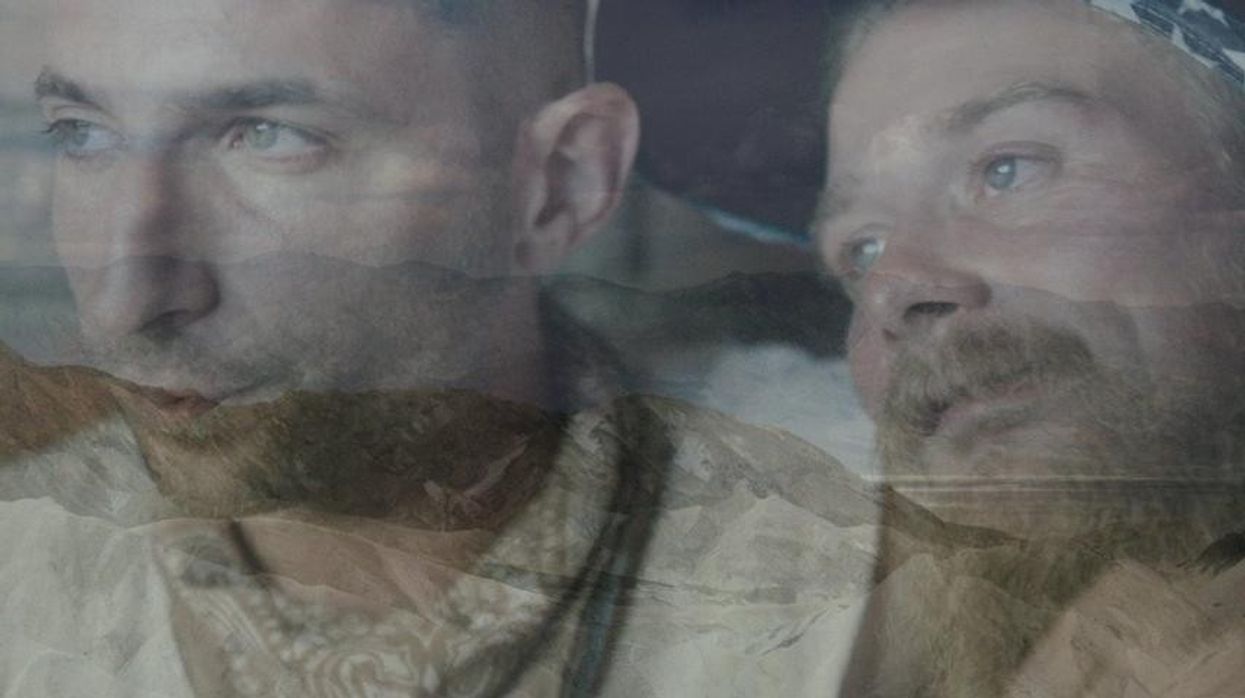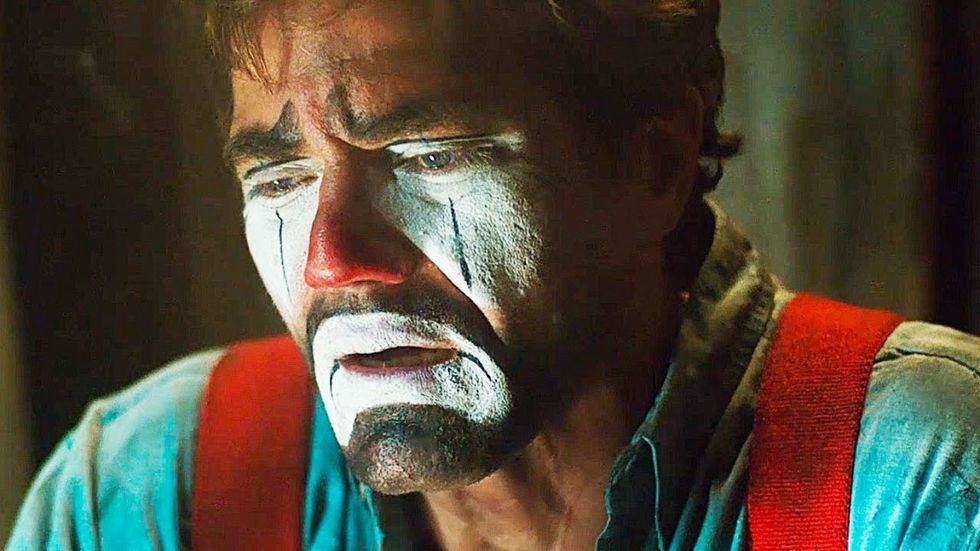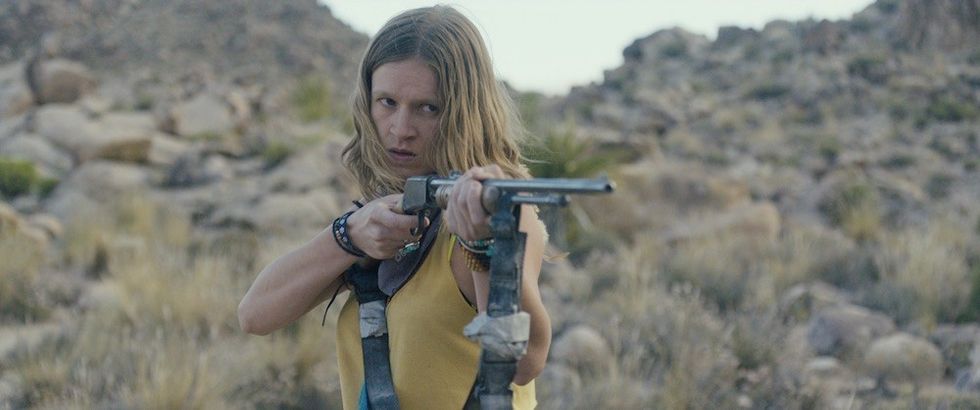A Western in Las Vegas with No Money: Robert Scott Wildes on His Debut Feature 'Poor Boy'
Making 'Poor Boy' was an intense, grueling experience for director Robert Scott Wildes, his cast, and his crew.

From its first few minutes, Poor Boy, director Robert Scott Wildes’ debut feature, has a quality of otherworldliness to it. This story of two brothers on a criminal quest (and the estranged father they often ruminate over) has elements of a number of familiar stories: tales of desperation, redemption, and fall-from-grace narratives. However, it bears s similarity to those stories in only the sparest of ways.
The characters Wildes has written are outliers: a small-time crook nicknamed Prickface, an angry rodeo clown, a trans crime kingpin. The movie is about life in their particular universe, and how it works or, in some cases, doesn’t. Buttressed by outstanding performances by Michael Shannon, Lou Taylor Pucci, and Dov Tiefenbach, the film explores the insides and mechanics of a timeless story.
As the film is currently in theaters, No Film School spoke with Wildes about how he took this film to the finish line.
No Film School: A lot of the characters in the film seem to exist outside of a moral code. What was it like to write about them?
Robert Scott Wildes: Well, I think it stems from the fact that me and my writing partner Logan have been obsessed with Cops since we were in college; we used to transcribe episodes. You just get addicted to the dialogue and narrative, and when you write it out and then read it back, it reads like a little novella. There’s something poetic about the journey these guys go on, like, for instance, trying to steal somebody’s lawnmower back. That was kind of the jumping-off point.
We’ve always been interested in people who have to scheme and con to make the status quo. That kind of character is really addicting for us as storytellers and for me as a filmmaker. We started with the lawnmower scene and took it from there. You take one little thing you’re addicted to, and then another thing you’re addicted to, and before you know it, you’ve got a long list of crazy scenarios called a movie.
NFS: Did the script change at all as you were developing the film?
Wildes: Kind of. There was one massive change—the loosest, most basic plot of the story is that there are these two brothers on a boat trying to sail to California to build a better life. We wrote it as a lake movie, because the inherent joke was going to be, how do you sail to an ocean from a lake? But we had almost no money to make the movie, and when we got to Nevada, we were told, "Sure, you can shoot on the lake, but it’s crazy expensive, like probably a thousand dollars a day."
But we already had the boat, and so we thought, "Let’s just park it in the middle of the desert. That would be the fundamental difference, and then, of course, there’s the inherent challenge of having zero dollars and trying to make a movie. Of course, you’re scrapping things minute by minute.
"You take one little thing you’re addicted to, and then another thing you’re addicted to, and before you know it, you’ve got a long list of crazy scenarios called a movie."
NFS: How did you find your locations? They’re vital to the story.
Wildes: Well, we had no money, like I said, and we had a lot of ammunition of enthusiasm and energy and insanity, and that kind of drove us. But on anything I’ve done, location scouting is probably the most expansive and comprehensive part of the production process. I location scouted for Poor Boy for nearly 12 months, constantly driving out to the desert. We scouted Phoenix and all kinds of places in Arizona, and ultimately ended in Nevada, but I went out there for weeks on-end, driving around for hours at a time and seeing everything in Las Vegas.
There were a few cast members in the film who were from the area and would help find these little honeycomb hideouts, these little nooks and cafes and lounges and abandoned malls, and then after that, we tried to get them to let us shoot there for free.
NFS: What was that process like? Did you have trouble?
Wildes: Yeah, we did have trouble, but I give all the credit in the world to Kristin Mann, the producer of the film. She did an incredible job. I had been doing this, going out and finding these locations, and I gave her my list, and I said, "Okay, these are my dream locations...." Some of these places probably weren’t even safe to shoot In. She’d respond, "Okay, I’ll go for it," and I think she got 90% of them.
I don’t know what she did, but she’s a very convincing woman! I’d put it on her, and there were a few key cast members from the area helping out with that. We ingratiated the local residents a bit, and that helped us get some of the places we otherwise wouldn’t have been able to shoot in.
NFS: The script itself is disjunctive and, you might say, poetic in a lot of spots. How did the actors deal with that quality, in terms of their line readings?
Wildes: If you were to talk to Lou Pucci, he would say it was—and I’m by no means comparing myself to a great poet—very much like reading something antiquated. In a way, Prickface had his own vernacular, kind of a mishmash of made-up words, expressions we stole from the Outer Banks, certain phrases like Whopperjawed. There’s an Outer Banks dictionary you can watch on YouTube, too. We were pulling from a variety of different sources.
To the actors I would give all the credit in the world—they said all that was written, and sometimes it had funky syntax, or it just repeated the same phrases over and over again. I worked with Lou and Dov Tiefenbach for maybe 12, 13, or 14 months on the material. Lou goes back-and-forth between New York and Los Angeles, where I'm based. We would sometimes have pages and pages of monologues, just crazy stuff, and he would practice them by sending me little recordings on his iPhone, and then we’d break it down and start working on it in person.
Lou really has the lion’s share of dialogue in the film. He became that character. He’s in a very healthy place now, but when we were shooting the film, he was Prickface and it was not an enjoyable experience for people to be around, because while you might want to make a movie about that character and watch it in a cinema, you don’t necessarily want to hang out with him for dinner that night.
"There’s an inherent poetry to the messiness of actual life."
NFS: That is something I thought about while I was watching the film. Michael Shannon must have had a slightly easier time with the dialogue because he’s always a little bit heightened.
Wildes: To Mike’s credit, he showed up on set completely off-book, and asked a couple of questions about the motivations for the things his character says, because he has a thre-to-four page monologue as well. He brought a beautiful intensity that really set the tone for the day. He was entirely in character; it was honestly just a privilege to be able to share space with him. I know the entire crew appreciated it.
Mike is obviously a phenomenal force. You know that going in because of his body of work, but he came in and he knocked it out of the park. But again, I cannot heap enough praise on Lou and Dov and the rest of the cast. He had seen some stuff that they had done already, and they were so committed. Mike’s a professional who’s going to bring his A-game no matter what he’s working on.
NFS: It sounds like there was a lot of really good teamwork, a very collaborative effort.
Wildes: Yeah, we were having a blast! It was super hard because we didn’t have money, we didn’t have any snacks or chairs, but we had this insane objective and we were all riding a rocket endlessly into outer space. I feel like that kind of collaborative glue really held the ship together.
When you’re in the middle of a storm, you don’t really see that. In hindsight, if you were to tell me this is what has to happen in order for this movie to get made, I would just think there’s no way we can do that. But you have to do it. Otherwise, what are you going to do, not make the movie?
Wildes: Well, it was written to all orchestral music, and then when we got into shooting it, I guess maybe there's an instinct to make it a little honky tonk, but I kind of thought of the film as a great epic Western about the proletarian absurdity of it all. I feel like there’s a beauty in the small hustle, in the simplicity of it, in the absurdity of trying to survive in the desert, and to me, that’s epic and beautiful and gorgeous, and I thought the music should reflect that.
NFS: You mentioned earlier you had done a lot of research for this project. Could you tell me a little bit about that process?
Wildes: Let’s say the Maysle brothers got their hands on an episode of Cops: what would that feel like? Those were two things I was very excited about as a storyteller. I looked at a lot of old rodeo films and home movies. There’s this great Jonathan Caouette film Tarnation, a prodigious first film by this kid who documented his whole life with his mom, cut together on iMovie, and I think Gus Van Sant finally saw it and released it, and it’s stunning because it’s this hodgepodge of formats without a real narrative. You've experienced this young man’s life as it unfolds, and the struggles he’s dealing with, and his dealing with his own sexuality, and how he’s handling that. Ours is very different, thematically, but I really latched onto that kind of film. It really spoke to me.
I also mined Instagram and YouTube, finding people who documented their lives, make home movies, blow up their backyard, etc., and that’s super inspiring stuff. There’s probably some bigger overarching influences that I’m not even fully aware of. Sure, there arew the giants of cinema that snuck their way into it. And then of course, you try to apply some level of craft. There were times when our cinematographer, Andrew Wheeler (who’s a great cinematographer) and the second cinematographer Adam Stone (who is a master filmmaker in his own right) would say, "This is the best way to shoot this" and we would talk about it. I’m constantly trying to find ways to fuck up the frame. It was one of those films that you wanted someone to find in an attic 25 years from now, and be like, 'What the fuck is this?" There’s an inherent poetry to the messiness of actual life.
For more information on 'Poor Boy,' click here.













